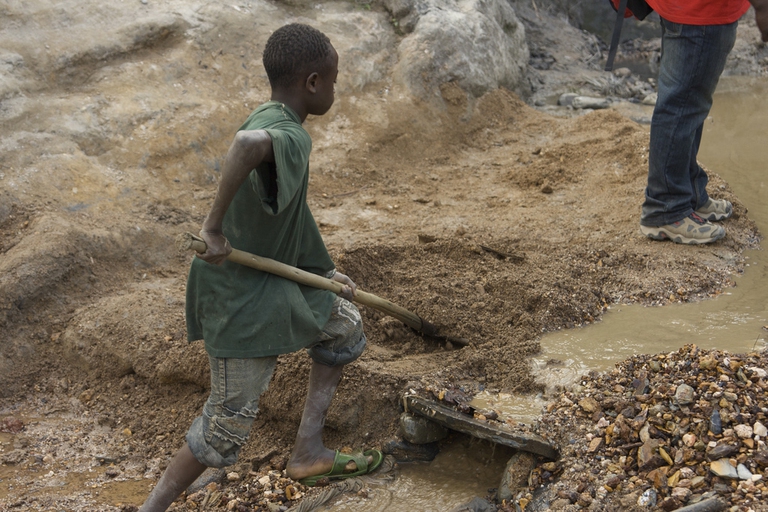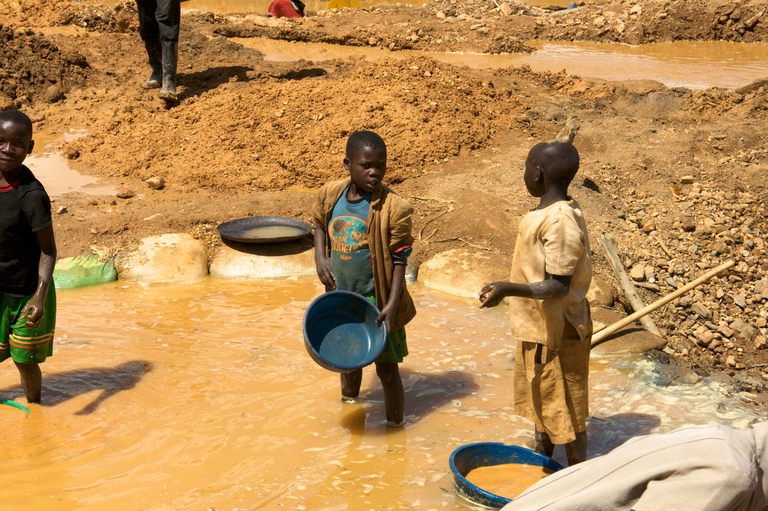
Costa Rica celebrated its first same-sex marriage when two women, Alexandra Quiros and Dunia Araya, celebrated their wedding: an “extraordinary moment”.
European Parliament approved a new regulation on conflict minerals importations in Europe
The European Parliament has adopted a new regulation to stop the importation of conflict minerals in Europe, reaching an important milestone towards fighting child labour and worker exploitation in conflict zones. The regulation, adopted in May, will come into force in 2021 and will be applied in all EU member states, requiring their companies to ensure that they import tin, tantalum, gold and tungsten only from responsible sources. These four minerals and metals are used in everyday products such as mobile phones and cars or in jewellery. Experts consider them among the most widespread in conflict areas.
Conflict areas in West and Central Africa, South America and East Asia are zones naturally rich in mineral resources that are also affected by civil war or political insecurity. Usually armed groups control mineral extraction, often through the use of forced labour, and the materials are sold to fund their illegal activities. Miners are victims of different human rights abuses, low salaries and poor working conditions in which minimum safety standards aren’t respected.
In recent years some states have introduced specific regulations to avoid the risk of indirectly contributing to the commercialisation of conflict minerals. The Dodd-Frank Wall Street Reform Act, for example, obliges US companies to carry out a due diligence review of their supply chains to determine whether their mineral purchases are funding armed groups or not. A due diligence process specifically includes a series of procedures to map human rights and environmental risks in the realm of the company’s direct operations, as well as those related to subsidiaries, subcontractors and suppliers, and conduct appropriate action to mitigate risks and prevent violations. This implies a grievance, or “alert” mechanism, to be developed in collaboration with relevant stakeholders, a monitoring scheme to assess the effectiveness of the vigilance plan and a final public report summarising this plan and its effectiveness.
According to this US rule, companies must report on their due diligence publicly and this must be independently audited. Moreover, last February France adopted the so-called “devoir de vigilance“, obliging the largest French companies to conduct mandatory human rights due diligence reviews.
A few years ago, the Organisation for Economic Cooperation and Development (OECD), an intergovernmental economic organisation with 35 member countries, also published specific guidance for companies on how to conduct a due diligence assessment of mineral supply chains from conflict zones. This is a soft law instrument, meaning that it doesn’t oblige companies to respect these procedures but helps encourage responsible business conduct.
Recent developments in the regulatory framework relating to conflict minerals help contrast human rights abuses and worker exploitation in conflict zones. In the near future they will aid in extending these legal measures to cover other minerals too. Current legislation, in fact, doesn’t include materials like cobalt, for example, which is connected to human rights violations in the Democratic Republic of Congo (DRC). According to human rights organisation Amnesty International’s Report This Is What We Died For, in the DRC thousands of artisanal miners, including 40,000 children, are exploited in cobalt mines.
Furthermore, European states and the US should promote mandatory due diligence processes also in other countries. On the one hand this would help overall human rights protection in conflict zones and on the other hand, from companies’ perspective, this would avoid the risk of other countries dumping minerals and metals at lower prices into the markets in which they operate. In this context, NGOs play a key role in raising awareness among the public, and consumers in pressuring companies to disclose what steps they’re taking to investigate, address, and remedy human rights risks in their supply chains.
Siamo anche su WhatsApp. Segui il canale ufficiale LifeGate per restare aggiornata, aggiornato sulle ultime notizie e sulle nostre attività.
![]()
Quest'opera è distribuita con Licenza Creative Commons Attribuzione - Non commerciale - Non opere derivate 4.0 Internazionale.
Costa Rica celebrated its first same-sex marriage when two women, Alexandra Quiros and Dunia Araya, celebrated their wedding: an “extraordinary moment”.
On top of a 2.4 million dollar compensation, the indigenous Ashaninka people will receive an official apology from the companies who deforested their lands in the 1980s.
From Italy to the United States, workers in the logistics and delivery sectors are protesting to demand better sanitary conditions to protect themselves from Covid-19.
The pandemic and its restrictions are affecting everyone, without exceptions. However factors like housing, income inequalities, gender, access to technology and working conditions are influencing how people experience the health crisis.
In the midst of India’s coronavirus lockdown, two dozen people lost their lives in a desperate bid to return home: migrant labourers forced to leave the cities where they worked once starvation began knocking at their doors.
Apple, Dell, Microsoft and Tesla are among the tech companies named in a lawsuit brought in the US by the families of children killed and maimed in cobalt mining activities in the Democratic Republic of Congo.
We, the people is Survival’s 2020 calendar, which features the winners of the photography contest showcasing images of the world’s indigenous peoples.
Un violador en tu camino – the rapist is you – is an anthem protesting the impunity of gender-based violence. It began in Chile and has become a global flash mob, bringing people to the streets and resonating all over the world.
Abiy Ahmed was awarded the Nobel Peace Prize for reaching peace with Eritrea. Yet, Indigenous groups in Ethiopia’s Lower Omo Valley have been abused by security forces, a fact that the prime minister must address, says the Oakland Institute.









